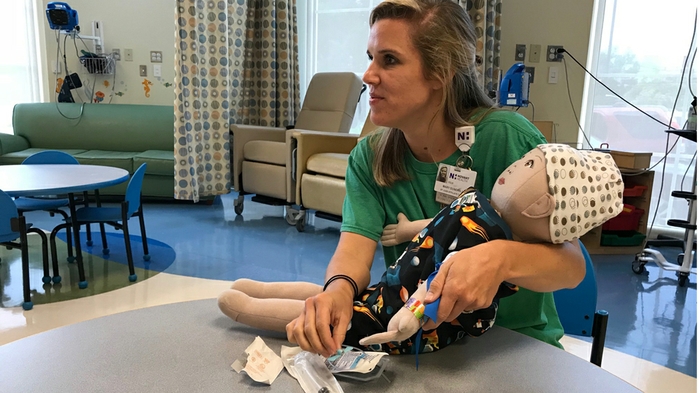Being hospitalized is a scary experience for anyone, but it can be especially traumatic for children. Child life specialists are trained professionals with expertise in helping children and their families overcome challenging events. Children who require medical procedures, from an X-ray to open-heart surgery, benefit greatly from having trained professionals on their care team who know how to calm their fears.
Child life services improve quality and outcomes in pediatric care as well as the patient and family experience. According to the American Academy of Pediatrics, child life specialists focus on the optimal development and well-being of infants, children, adolescents and young adults while promoting coping skills and minimizing the adverse effects of hospitalization, healthcare and/or other potentially stressful experiences.
Open talk is best
Child life specialist Mary Duncan Johnson walks the journey with children and their families at the St. Jude Affiliate Clinic at Novant Health Hemby Children’s Hospital . From diagnosis to weekly treatments, she is there to comfort, empower and educate her patients.
To help a child cope with painful treatments and intrusive procedures, a child life specialist often uses “medical play” that allows children to manipulate real and pretend medical equipment to become more familiar with the procedures they encounter.
Johnson also said one of the most important parts of her job is explaining a child’s diagnosis to him or her in an age-appropriate way.
“At the St. Jude clinic, child life specialists encourage our families to use the word ‘cancer’ openly with their children to help the child become more familiar with the word and at ease when asking questions,” Johnson said. “Child life specialists are an important component of diagnosis education, as they are extensively trained in child development, family systems and positive coping; they speak the language of children to make chronic illness less frightening for patients and their families.”
What do they do?
While child life specialists typically do not care for a child’s physical health, they are an integral part of the care team. They help children prepare for surgery or other medical procedures, explain medical jargon and encourage activities that support children’s development.
They pay special attention to the child’s family and siblings.
“Siblings can be faced with long separations from the patient and family, unfamiliar environments and changes in routines,” Johnson said. “Siblings often have many questions and fears related to their brother or sister’s illness; it is important that these are addressed using honest, concrete and simple words.”
How can music therapy help?
The waiting room even provides comfort for patients and their families. Music teacher and longtime hospital volunteer Kevin Gill plays the guitar and sings with patients at St. Jude every Monday. Whether he is playing “Old McDonald” in the waiting room or the favorite song of a child receiving an IV treatment, it is apparent how valued he is.
This type of therapy involves using music therapeutically to address physical, psychological, cognitive, behavioral and social functioning. The music is designed to create an environment for the child that is success-oriented, focusing on making the child feel better about themselves and their diagnosis, according to The American Music Therapy Association, Inc .
For instance, a simple, classic tune can distract a child and ease anxiety before an appointment, Gill said. Research has shown that music therapy can effect changes in a child’s behavior and foster development of their communication, social, emotional and cognitive skills.
The St. Jude Affiliate Clinic at Novant Health Hemby Children’s Hospital does everything possible to tackle the “monsters.” Engaging children, easing anxiety and being a support system is just an example of the remarkable work being done every day.
St. Jude Affiliate Clinic at Novant Health Hemby Children's Hospital is devoted to providing complete care to children and adolescents suffering from cancer or blood disorders. If you have any questions about a treatment plan for your child, or if you are seeking a second opinion, call 704-384-1900.






